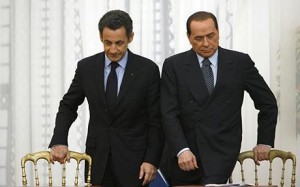 On a backdrop of rising nationalist sentiments in Europe, the refugees of the Arab Spring have put pressure on one of the EU’s most significant achievements; the Schengen Agreement. This agreement allows unrestricted travel between Schengen’s 25 participants. The project that in a very tangible way symbolizes the idea of an integrated and united Europe is now being reconsidered. Is this a sign of a less European Europe?
On a backdrop of rising nationalist sentiments in Europe, the refugees of the Arab Spring have put pressure on one of the EU’s most significant achievements; the Schengen Agreement. This agreement allows unrestricted travel between Schengen’s 25 participants. The project that in a very tangible way symbolizes the idea of an integrated and united Europe is now being reconsidered. Is this a sign of a less European Europe?
On the one hand, there are indications that national prerogatives, spearheaded by Berlusconi and Sarkozy, have trumped the supranational European Commission. After a meeting on April 26 addressing the refugees fleeing the upheavals in North Africa, the two leaders issued a letter to European Council President Van Rompuy and Commission President Barroso calling for border checks at internal borders.
 All in all, the French/Italian proposition has received approval from both national and Commission leaders. After some initial backlash from the Commission related to France rounding up North African immigrants and sending them back to Italy – an action that in principle violates the Schengen border-free area – the French/Italian initiative has gained traction.
All in all, the French/Italian proposition has received approval from both national and Commission leaders. After some initial backlash from the Commission related to France rounding up North African immigrants and sending them back to Italy – an action that in principle violates the Schengen border-free area – the French/Italian initiative has gained traction.
For example, Home Affairs Commissioner Cecilia Malmström’s initial reaction to French actions was to make clear that France was not acting in the spirit of Schengen.
“In principle ‘no’, the French authorities cannot send them back to Italy”, said Malmström. “France could evoke a serious threat to public order, but this is not the case here”, she said, referring to a clause stipulating that borders can be temporarily shut down in “exceptional” circumstances.
Following the Sarkozy/Berlusconi letter, the Commission has watered down this stance. Commission spokesman Oliver Bailly admitted that “We must avoid having holes in the system”, and apparently agreed with statements by Italian Foreign Minister Franco Frattini that legal texts “grow old” and have to evolve. Although, Bailly did make clear that “You would have to leave the EU to suspend Schengen.”
In particular, Europe’s nationalist parties have, through pressure on government leaders, made their preference for border controls be felt. To name a few: In Italy, the Northern League has Berlusconi’s ear, while Sarkozy’s domestic position gives the president reason to placate France’s right-wing. In smaller EU countries the story is the same. In the Netherlands the kingmaker Geert Wilders has thundered against open borders, while Denmark’s Danish People’s Party also has called for a reinstatement of border controls – denying that this would imply a break with Schengen paragraphs. Similar examples can be found throughout Europe.
Somewhat paradoxically, this tightening of internal borders is taking place in the very days that Germany and Austria will open their borders to eastern European workers, after waiting the maximum seven year period since the 2004 enlargement. This measure was aimed at stemming a flood of eastern European labor that never actually materialized in the rest of the western European memberstates. Of course, the situation in North Africa is vastly different than the situation in Eastern Europe. But regardless of this difference, the anti-immigration sentiments stem from the same groundswell, and Europe’s principle of free movement seems increasingly out of touch with this political reality.
On the other (European) hand, while there is a growing consensus that border controls must be tightened, Schengen has been hailed by some as a cornerstone of European integration that must not be given up. For example, Germany’s Foreign Minister Guido Westerwelle stated that, while Schengen could be improved, “travel freedom in Europe is such an important achievement that it should not be up for renegotiation.” Such sentiments imply a European rather than a national solution to border controls.
BBC´s Gavin Hewitt points out that Italy intentionally “Europeanized” the immigration problem. Italy issued Tunisian migrants with temporary visas knowing full well that they would move on to France where connections with Tunisia are strong. France’s flaunting of Schengen would not be accepted in the EU who would be forced to take collective action. The Europeanization of this issue could quite possibly prompt a strengthening of European, as opposed to national, border control measures.
The provision of Schengen stating that national border control may only be implemented in cases of threat to national security will be re-interpreted in a yet to be determined fashion. The Commission is set to re-define what these “exceptional” circumstances precisely will consist of in a proposal due May 4.
What will come of this clash of principal and populism? Certainly, the border controls will be tightened. The question is, will the tightening be a European response and result in “more Europe”, or will it instead result in more national control of borders? We will be wiser come May 4.